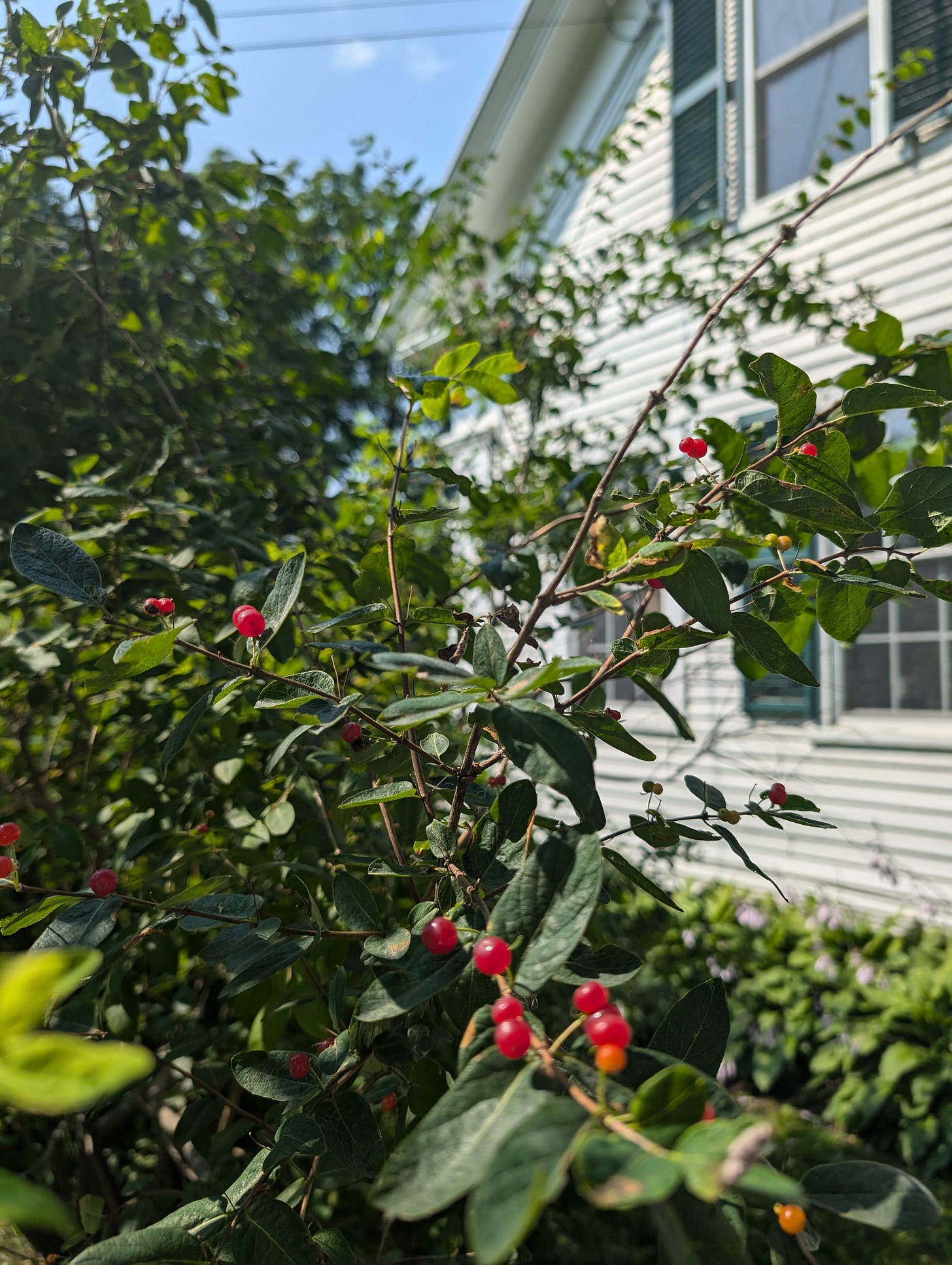Dwelling Places
What we choose and who God chooses
Now when the king was settled in his house and the Lord had given him rest from all his enemies around him, the king said to the prophet Nathan, “See now, I am living in a house of cedar, but the ark of God stays in a tent.”
2 Samuel 7:1-2
Our Houses
Many of my childhood memories are little more than a snapshot and a vibe. That’s all I have of my first NFL game to see the Carolina Panthers play. I can’t remember how old I was or who we played, just that it was preseason. But I didn’t care it was preseason, because I remember the image of the stadium and the feeling of walking in. Awe. It was the same feeling I’ve gotten in many other professional sports stadiums and concert venues, from the Dean Dome to Dodgers Stadium to Fenway or even the home of the despised Yankees—“The House That Ruth Built”1—that I was walking into something majestic.
I still love any time I take the first steps into sports cathedrals. And anytime I’m in a big city, I love visiting actual cathedrals. When we were in Montreal a few months ago, we visited Cathedral Marie-Reine-du-Monde, “Mary, Queen of the World.” Like all of them, the awe wasn’t just about the size of the place, but all the corridors, the paintings, the stained glass, the saints, the whole atmosphere. A house of God.
But I would be a bad Protestant if I didn’t point out there’s just a small problem with that. It’s not that it’s wrong, per se, but it’s not specific enough. It’s what David would discover in our reading this week in 2 Samuel. David, king that he is, is still on a spiritual journey, and he’s still learning.
In this part of David’s journey, he offers God to build him a house to live in.2 David lives in a majestic palace, a “house of cedar,” and his thinking is logical: I live in this awesome place, and God lives in this rinky-dink tent, this just isn’t right…we should at least live in the same neighborhood!
But this is not God’s call for him. While God would later ask for a temple, perhaps needed in the story of Israel, by denying David his spiritual zoning permit God establishes that his final, ultimate, or most essential dwelling place. He tells David that his dwelling place is even closer:
Thus says the Lord of hosts: I took you from the pasture, from following the sheep to be prince over my people Israel, and I have been with you wherever you went…When your days are fulfilled and you lie down with your ancestors, I will raise up your offspring after you, who shall come forth from your body, and I will establish his kingdom. He shall build a house for my name, and I will establish the throne of his kingdom forever. I will be a father to him, and he shall be a son to me.
2 Samuel 7:8-9, 12-14
But waybe we are innocently confused like David, for we are not often as easily moved to awe and wonder at God’s dwelling place, but wish to make the things that give us awe and wonder, and then tell God, “Here is your dwelling place. Isn’t it wonderful? Here is your cathedral, your Madison Square Garden, your Red Rocks theater.” Sometimes we don’t put God in a physical dwelling place, but make for him a dwelling place of our favorite personal experiences: “Here, Lord, is your weekend getaway, here is your party, here is your festival, here is your ecstastic mystical union a saint would envy.” Or we make him a dwelling place of our personal piety, “Here God, I have made a spiritual home finally fit for you where I follow your Word to a T,” or a home of peak physical fitness, or a sharp intellectual mind where God can hang out in your ideas.
These are (mostly) fine things by themselves. But to all of these it’s as if God says, “What do you mean you’ve built for me ‘my’ dwelling place? Is it not my call to choose my dwelling place? And was I not with you anyway?”
This is not to say that beautiful houses of worship and spectacular architecture can’t inspire beauty and can’t make us think of God as our eyes look up to the heavens, or out among the cheering fans celebrating the shared love of life through the love of a game. It’s just more specific. As David learns and as Paul’s letter to the Ephesians affirms, God chooses to dwell somewhere else.
Remember that you were at that time without Christ, being aliens from the commonwealth of Israel and strangers to the covenants of promise, having no hope and without God in the world. But now in Christ Jesus you who once were far off have been brought near by the blood of Christ.
Ephesians 2:12-13
People of God
Maybe you’re like me and you haven’t only been awe-inspired by buildings, but by certain people. Most recently in my life, the monk I had been most inspired and influenced by was Thomas Merton, but there have been many other saints. Bonhoeffer. Francis. Rogers, Mister. And that’s just the openly Christian. I’ve admired many other “saints,” the personal canon of artists in my life who may not be openly Christian saints but have lived a life that I encountered as divine, all my favorite musicians and thinkers and comedians and artists and activists and rebels and more. You have your own, I’m sure, those people whom you can just feel are brimming with something divine. Like the saints in that Montreal cathedral, we’d learn their stories, we’d venerate their excellence, and we’d say, “God wassurely at work in this person.” And so maybe we are inspired to live a little like them. Maybe in some way we want to make ourselves into a living cathedral, glorious, majestic. This is not necessarily a bad thing.
But there can also be a problem. We might forget that God does not choose us for our majesty. And he has not chosen you because of your cathedral-ness. Instead, like David and like all others who he has ever chosen and for whom Christ died, he chooses sinners. He chooses the broken. He chooses not the most skilled or the wisest but often the people who may be good at only one thing or maybe not much at all. On some level we know this. And yet many of us still, if we are honest, are moved to awe and wonder at celebrity culture, if not the world’s celebrities then our personal pantheon of divine beings. And to be sure, they’re fine enough people. But as for where the living God lives, celebrity is the wrong address. And until we are moved to wonder at the poor, the prisoner, the naked, and the sick, we still have the wrong address. But the good news is that even in our spiritual sickness that is fascinated with human glory, God still works through this sickness, and he still chooses to dwell in us.
In him the whole structure is joined together and grows into a holy temple in the Lord, in whom you also are built together spiritually into a dwelling place for God.
Ephesians 2:21-22
Mountains and the Universe
Being God’s dwelling place was no accident. As Paul emphasizes in Ephesians and elsewhere, even we Gentiles are adopted (Eph 1:5); intentionally chosen. And this was not an accidental whim. From the foundation of the world (Eph 1:4), we were chosen in Christ and in his body for a task, for an assignment, chosen from the beginning of all time to play a role we cannot possibly know. Just like with David in his kingship and so many other biblical figures, sometimes it might feel like our role is to let other people learn about sin through our sin. But even in this, we are chosen in his glory.
Our texts today (2 Samuel 7 and Ephesians 2) are really at two different mountaintops, a vista to see the rest of Scripture. Some have said 2 Samuel 7 is a kind of the mountaintop for the Old Testament, the high point of David’s kingship and thus the high point of Israel in their journey. We are where Israel has been building towards, and both David and Israel’s fate is to start painfully coming back down into a brutal wilderness again. And in Ephesians 1-3, we are at a mountaintop of Paul’s theology in his letters,3 a swirling, universal, all-temporal, Trinitarian view of the world and Christ’s role in it.
And yet we can’t forget that if we have two mountain vistas of Scriptural landscape, we have two sinners atop them. Many people I know still dislike Paul, often not liking what he says or how he says it. Like David, sometimes God uses him to show God’s goodness; sometimes, God seems to use Paul to teach us something about sin. And yet here he is, offering us a majestic view from the ledge. David is there with him, even though it’s about to get worse for him.
Just as we Christians can read 2 Samuel 7 and see a prophecy unveiling God’s true home, the foretaste of Christ coming through the Davidic line which makes sense of all history, this part of Ephesians also gives us an outlook of all history in a cosmic, universal mystery of Christianity. Here we see the cross is a flashpoint history in time, a bursting open of the universe, a bursting open of divinity, a ripping open, an unfolding into grace, grace, and grace. Just as Abraham was thousands of years in the ripple effect beforehand backwards in time, we nowlive thousands of years in the ripple afterwards. God’s love and mercy flowing every which way at things beyond our knowledge and understanding, beyond our control and under his, “For by grace you have been saved through faith, and this is not your own doing; it is the gift of God.” (Eph 2:8)
Chosenness
And yet if it’s so cosmic and so universal, the Word is also so specific, and so personal, in telling us who God chooses to live…if we can believe it.
But if I had to average all the times in my life together, I’d say on average I have not felt like God’s dwelling place. If I had to average it all together, I’d have to say I have felt more like a house where every little variety of sin was made perfectly home. A place to live dishonestly here, a place for lust there, an alcove for scheming over there, a nook for self-righteousness above the self-serving stairs, sloth and gluttony in every which cabinet. Depending on when you’ve asked me, I have felt more often in my life that I live in a dwelling place more for depression and hopelessness, a house of “what’s the point?” It is a house where I have often heard other people talking about being “chosen” and I felt a bit indignant at their arrogance. Many days there are many ways in which our bodies and minds seem more fit for sin like a glove than for God.
I don’t know how common this is. A preacher is sometimes supposed to go from things they feel themselves to “Here’s all the things we all feel,” and there’s much danger in guessing wrong about that. Unlike Christ, I don’t know how universal my feelings are. But I know some of us don’t feel God dwells in us. We don’t know what use he has for us. “I’m in the nursing home, why am I still here?” “What could he want of me?” “I can’t do what I used to do and I just can’t be happy about that.” “I can’t keep up with the demons that tell me to just peace out.” “I’m still recovering from a mistake I made years ago.” These are just a few flavors of, “How could God live in me?” And maybe this was one difference between David and Saul; behind his power and glory seeking, Saul’s insecurity could not really believe that God would want to live in him as he was.
Yes, God would eventually have a physical temple built for his people, and there is nothing wrong with building a beautiful building for God in and of itself. The beauty of the buildings I work and worship and live in make me feel God’s intimacy. But lest we forget it’s not ultimately where God lives.
We don’t choose for God where he lives, and indeed, we may not choose ourselves. But miraculously, God chose us. And I don’t mean us Protestants, or even just us believers, but in Christ, in the fullness of time, before the foundation of the world, he chose humankind to be his dwelling place if we will but open the door.
And maybe today we say “Sure, yes, Amen,” to that, and then an hour goes by and we go on feeling like God’s not dwelling anywhere near. Maybe you haven’t believed in God in forever. Or maybe you have faith and you know you were baptized in a sign and seal of his love and you know he’s somewhere, but you haven’t felt the Holy Spirit near. At least one sliver of good news, then, is that the Holy Spirit is not a feeling. God is not waiting for us to feel him for him to work in our lives. He feels first. And he moves first.
Again as Paul emphasizes, in Christ, God chooses us. Just as he chose David the sinner, king of Israel the unfaithful and wayward people, just as he chose the church of us arrogant hypocrites, just as he chooses the downtrodden and oppressed and those society thinks are useless, so he also chooses you.
And he didn’t choose only you. For Christ dwells in his whole body, all of us together, the whole rocky ship, the kit and the kaboodle, the crows and the thieves, the Quakers and the Shakers. The poor, the sick, the prisoner, the outcast. When you feel like you aren’t a dwelling place for him, can you at least believe that you are part of his Body where he does dwell? Maybe you feel like his most useless member, the most worthless place he could pick, but can you believe that together, all of us in him, is where we are, and that is where you are, fully and wholly in Christ?
God didn’t choose David because he could build him something worthy. He didn’t choose us to be his dwelling place because we could do anything glorious at all. He chose us, and chose you, out of his love. And in Christ, however you are, whatever shape you’re in, however far you feel from him, however little like a cathedral or you feel like…when it comes to his living quarters, he will always keep choosing you.
Though I’ve been told a congregant’s relative actually was the construction supervisor for the project, so it’s really The House That Anderson Built.
Shoutout as always to At Home With the Lectionary podcast for the conversation on the David passage here.
There are strong arguments on each side as to whether Paul himself wrote the letter, but either way Ephesians is a foundation of Pauline theology.






